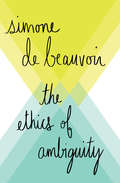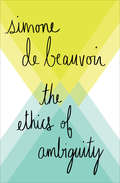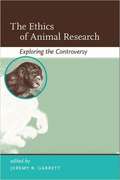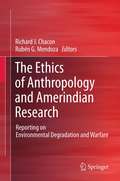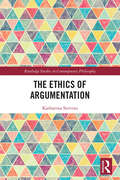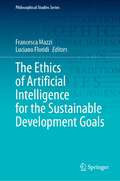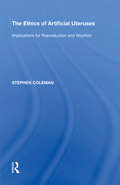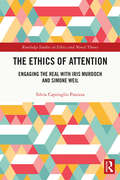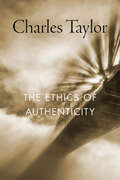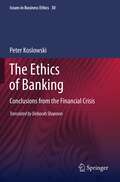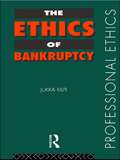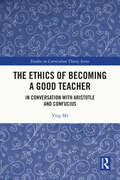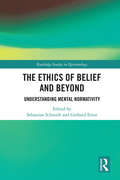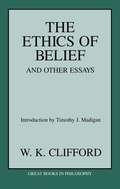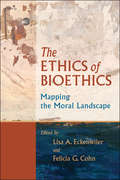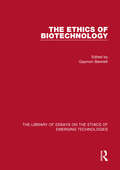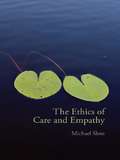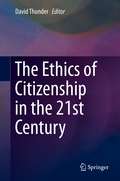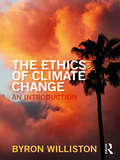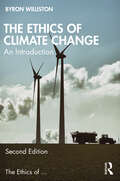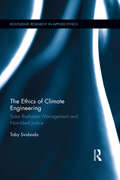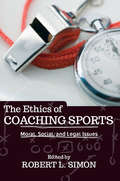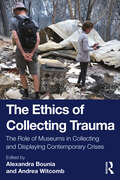- Table View
- List View
The Ethics of Ambiguity
by Simone De BeauvoirIn de Beauvoir's second major essay, the renowned French philosopher illustrates the ethics of Existentialism by outlining a series of "ways of being"In this classic introduction to Existentialist thought, French philosopher Simone de Beauvoir's The Ethics of Ambiguity simultaneously pays homage to and grapples with her French contemporaries, philosophers Jean-Paul Sartre and Maurice Merleau-Ponty, by arguing that the freedoms in Existentialism carry with them certain ethical responsibilities. While contemplating Nihilism, Surrealism, Existentialism, Objectivity, and human values, The Ethics of Ambiguity is a thorough examination of existence and what it means to human life. To do this, de Beauvoir outlines a series of "ways of being" (the adventurer, the passionate person, the lover, the artist, and the intellectual), each of which overcomes the former's deficiencies, and therefore can live up to the responsibilities of freedom. Ultimately, de Beauvoir argues that in order to achieve true freedom, one must battle against the choices and activities of those who suppress it.
The Ethics of Ambiguity: The Second Sex And The Ethics Of Ambiguity
by Simone de BeauvoirFrom the groundbreaking author of The Second Sex comes a radical argument for ethical responsibility and freedom. In this classic introduction to existentialist thought, French philosopher Simone de Beauvoir&’s The Ethics of Ambiguity simultaneously pays homage to and grapples with her French contemporaries, philosophers Jean-Paul Sartre and Maurice Merleau-Ponty, by arguing that the freedoms in existentialism carry with them certain ethical responsibilities. De Beauvoir outlines a series of &“ways of being&” (the adventurer, the passionate person, the lover, the artist, and the intellectual), each of which overcomes the former&’s deficiencies, and therefore can live up to the responsibilities of freedom. Ultimately, de Beauvoir argues that in order to achieve true freedom, one must battle against the choices and activities of those who suppress it. The Ethics of Ambiguity is the book that launched Simone de Beauvoir&’s feminist and existential philosophy. It remains a concise yet thorough examination of existence and what it means to be human.
The Ethics of Animal Research
by Jeremy R. GarrettAn estimated 100 million nonhuman vertebrates worldwide--including primates, dogs, cats, rabbits, hamsters, birds, rats, and mice--are bred, captured, or otherwise acquired every year for research purposes. Much of this research is seriously detrimental to the welfare of these animals, causing pain, distress, injury, or death. This book explores the ethical controversies that have arisen over animal research, examining closely the complex scientific, philosophical, moral, and legal issues involved. Defenders of animal research face a twofold challenge: they must make a compelling case for the unique benefits offered by animal research; and they must provide a rationale for why these benefits justify treating animal subjects in ways that would be unacceptable for human subjects. This challenge is at the heart of the book. Some contributors argue that it can be met fairly easily; others argue that it can never be met; still others argue that it can sometimes be met, although not necessarily easily. Their essays consider how moral theory can be brought to bear on the practical ethical questions raised by animal research, examine the new challenges raised by the emerging possibilities of biotechnology, and consider how to achieve a more productive dialogue on this polarizing subject. The book's careful blending of theoretical and practical considerations and its balanced arguments make it valuable for instructors as well as for scholars and practitioners.
The Ethics of Anthropology and Amerindian Research
by Richard J. Chacon Rubén G. MendozaThe decision to publish scholarly findings bearing on the question of Amerindian environmental degradation, warfare, and/or violence is one that weighs heavily on anthropologists. This burden stems from the fact that documentation of this may render descendant communities vulnerable to a host of predatory agendas and hostile modern forces. Consequently, some anthropologists and community advocates alike argue that such culturally and socially sensitive, and thereby, politically volatile information regarding Amerindian-induced environmental degradation and warfare should not be reported. This admonition presents a conundrum for anthropologists and other social scientists employed in the academy or who work at the behest of tribal entities. This work documents the various ethical dilemmas that confront anthropologists, and researchers in general, when investigating Amerindian communities. The contributions to this volume explore the ramifications of reporting--and, specifically,--of non-reporting instances of environmental degradation and warfare among Amerindians. Collectively, the contributions in this volume, which extend across the disciplines of archaeology, anthropology, ethnohistory, ethnic studies, philosophy, and medicine, argue that the non-reporting of environmental mismanagement and violence in Amerindian communities generally harms not only the field of anthropology but the Amerindian populations themselves.
The Ethics of Argumentation (Routledge Studies in Contemporary Philosophy)
by Katharina StevensThis book offers a new approach to the theory of argumentation that conceptualizes argumentation as a fundamentally ethical activity whose norms are grounded in, and must be selected according to, moral reasons.Current normative approaches to argumentation do not treat ethics as an integral part of argumentation theory. This is at least in part due to a methodological commitment not to address internal states of the arguers, such as intentions and beliefs, which makes moral theorizing about argumentation difficult. This book presents three arguments for why ethics ought to be a central element in normative theorizing about argumentation. Through these arguments it shows, first, that ethics is needed for providing normative argumentation theory with its foundation and for offering arguers reliable guidance for decision- making, both about which norms ought to govern their arguing and how they should shape each argument they make. Second, it addresses some of the most persistent problems faced by currently dominant normative approaches to argumentation, most notably that they are only reliable under the assumption that unrealistic background conditions are fulfilled. Finally, it provides the groundwork for a systematic ethics of argumentation. It does so by showing how a function of argumentation can be justified via moral reasons and by providing the outlines for both an applied ethics of (meta- level) normative argument design and an applied role-ethics of object-level arguing.The Ethics of Argumentation is essential reading for researchers and graduate students in a wide range of disciplines— including philosophy, communication studies, linguistics, and rhetoric— who are interested in communication, deliberation, argumentation, critical thinking, and social epistemology.
The Ethics of Aristotle: The Nicomachean Ethics
by Hugh Tredennick J. A. K. ThomsonThe system which Aristotle expounds and advocates in the Nicomachean Ethics stands as one of the most celebrated and influential of moral philosophies. Since its construction in the fourth century B.C. it has had a profound and lasting effect: by later philosophers it has been fervently embraced and critically rejected, but never coldly ignored; and in certain crucial respects it has helped to shape and mould the common moral consciousness.
The Ethics of Armed Humanitarian Intervention
by Don E. ScheidThe question of military intervention for humanitarian purposes is a major focus for international law, the United Nations, regional organizations such as NATO, and the foreign policies of nations. Against this background, the 2011 bombing in Libya by Western nations has occasioned renewed interest and concern about armed humanitarian intervention (AHI) and the doctrine of Responsibility to Protect (RtoP). This volume brings together new essays by leading international, philosophical, and political thinkers on the moral and legal issues involved in AHI, and contains both critical and positive views of AHI. Topics include the problem of abuse and needed limitations, the future viability of RtoP and some of its problematic implications, the possibility of AHI providing space for peaceful political protest, and how AHI might be integrated with post-war justice. It is an important collection for those studying political philosophy, international relations, and humanitarian law.
The Ethics of Artificial Intelligence for the Sustainable Development Goals (Philosophical Studies Series #152)
by Luciano Floridi Francesca MazziThis volume provides an extensive overview of the Ethics of Artificial Intelligence for the Sustainable Development Goals. The authors are experts contributing with perspectives from different fields. The comprehensive collection of chapters illustrates the pressing governance problems related to using AI for the SDGs, and case studies describing how AI is advancing and can advance the achievement of the Goals. Students, scholars, and practitioners working on AI for SDGs, the ethical governance of AI, sustainability, and the fourth revolution can find this book a helpful reference.
The Ethics of Artificial Uteruses: Implications for Reproduction and Abortion (Ashgate Studies In Applied Ethics Ser.)
by Stephen ColemanEctogenesis, the gestation of the foetus outside of the human body, will not for much longer be in the realm of science fiction; a number of projects attempting to develop ectogenetic technology are currently under way. This book examines the ethical implications of the development of ectogenesis. Examining the implications for abortion ethics in particular, this book also deals with the ethical objections to developing such a technology and the uses to which it may be put, such as creating embryos to supply donor organs for transplantation. The development of the artificial uterus may well be similar to cloning: a sudden technological advance with dramatic ethical implications, thrust suddenly into the public eye.
The Ethics of Attention: Engaging the Real with Iris Murdoch and Simone Weil (Routledge Studies in Ethics and Moral Theory)
by Silvia Caprioglio PanizzaThis book draws on Iris Murdoch’s philosophy to explore questions related to the importance of attention in ethics. In doing so, it also engages with Murdoch’s ideas about the existence of a moral reality, the importance of love, and the necessity but also the difficulty, for most of us, of fighting against our natural self-centred tendencies. Why is attention important to morality? This book argues that many moral failures and moral achievements can be explained by attention. Not only our actions and choices, but the possibilities we choose among, and even the meaning of what we perceive, are to a large extent determined by whether we pay attention, and what we attend do. In this way, the book argues that attention is fundamental, though often overlooked, in morality. While the book’s discussion of attention revolves primarily around Murdoch’s thought, it also engages significantly with Simone Weil, who introduced the concept of attention in a spiritual context. The book also engages with contemporary debates concerning moral perception and motivation, empirical psychology, animal ethics, and Buddhist philosophy. The Ethics of Attention will be of interest to researchers and advanced students working on Iris Murdoch, Simone Weil, ethics and moral psychology, and the philosophy of attention.
The Ethics of Authenticity
by Charles TaylorEverywhere we hear of decline, of a world that was better before the influence of modernity. While some lament Western culture’s slide into relativism and nihilism and others celebrate the trend as a liberating sort of progress, Taylor calls on us to face the moral and political crises of our time, and to make the most of modernity's challenges.
The Ethics of Banking: Conclusions from the Financial Crisis
by Peter KoslowskiThe Ethics of Banking analyzes the systemic and the ethical mistakes that led to the crisis. It keeps the middle ground between excusing all failures by the argument of a systemic crisis not to be taken responsibility for by the financial managers and the moralistic reproach that only moral failure is at the origin of the crisis. It investigates the role of speculation in the formation of the crisis and distinguishes between productive speculation for hedging and for securing market liquidity on the one hand, and unproductive and even detrimental hyper-speculation going far beyond of the degree of speculation that is necessary in a developed economy for the liquidity of financial markets, on the other hand. Hyper-speculation has increased the risks of the financial system and is still doing so.
The Ethics of Bankruptcy (Professional Ethics)
by Jukka KilpiThe fundamental ethical problem in bankruptcy is that insolvents have promised to pay their debts but can not keep their promise. The Ethics of Bankruptcy examines the morality of bankruptcy. The author compares and contrasts the Humean doctrine of promises as useful conventions with the Kantian view of autonomous agency constituting promissory obligations; he explores ethical concerns raised by forgiveness, utilitarianism and distributive justice and the moral aspects of insolvents' contractual, fiduciary, tortious and criminal liability. Finally, the author assesses recent bankruptcy law reforms. Bankruptcies severly hurt creditors and society. For the insolvents and their families the experience is painful and stigmatising, yet philosophers have paid little attention to the moral aspects of this violent social phenomenon. The Ethics of Bankruptcy is the first comprehensive study that employs the tools of ethics to examine the controversies surrounding insolvency, which makes valuable and sometimes controversial reading in a decade recovering from the Recession.
The Ethics of Becoming a Good Teacher: In Conversation with Aristotle and Confucius (Studies in Curriculum Theory Series)
by Ying MaThis book explores Aristotelian and Confucian wisdom traditions to understand education and what counts as a good teacher in an embodied dialogic approach. The book creates a dialogue between ancient ideas and the author’s lived experiences as a teacher in cross-cultural landscapes today to ruminate on the important themes of educational purpose, teacher excellence, teacher-student relationships, and teaching skill. It asks fundamental educational questions including "Why Do We Educate? Eudaimonia and Dao"; "What Do We Educate? Phronesis, Philia and Ren"; and "How Do We Educate? Techne and Liuyi". Moving beyond the dominant epistemological concerns such as how to teach more effectively to help students gain better marks in schools, it constitutes an ethical inquiry that illuminates the values, purposes, concerns, and hopes that animate genuinely educational work. Using a comparative approach to wisdom traditions from both the East and the West, it addresses parochialism and challenges Eurocentric research paradigms. Embedded in the messy ground of teaching in intergenerational and cross-cultural narratives, the author’s own experiences as a student/teacher/daughter of a teacher/mother of a student crucially unpacks and concretizes ancient concepts and reactivates them in concrete situations. A sense of a whole without completeness, a conception of the good without closure, and an aspiration without achievement continue to haunt the search for an ultimate answer to the question "what counts as a good teacher?". It will appeal to scholars, teachers, and teacher educators with an interest in narrative inquiry and educational research, as well as those in the field of curriculum studies and the philosophy of education.
The Ethics of Belief and Beyond: Understanding Mental Normativity (Routledge Studies in Epistemology)
by Gerhard Ernst Sebastian SchmidtThis volume provides a framework for approaching and understanding mental normativity. It presents cutting-edge research on the ethics of belief as well as innovative research beyond the normativity of belief—and towards an ethics of mind. By moving beyond traditional issues of epistemology the contributors discuss the most current ideas revolving around rationality, responsibility, and normativity.The book’s chapters are divided into two main parts. Part I discusses contemporary issues surrounding the normativity of belief. The essays here cover topics such as control over belief and its implication for the ethics of belief, the role of the epistemic community for the possibility of epistemic normativity, responsibility for believing, doxastic partiality in friendship, the structure and content of epistemic norms, and the norms for suspension of judgment. In Part II the focus shifts from the practical dimensions of belief to the normativity and rationality of other mental states—especially blame, passing thoughts, fantasies, decisions, and emotions. These essays illustrate how we might approach an ethics of mind by focusing not only on belief, but also on debates about responsibility, rationality, the normativity of involuntary mental states.The Ethics of Belief and Beyond paves the way towards an ethics of mind by building on and contributing to recent philosophical discussions in the ethics of belief and the normativity of other mental phenomena. It will be of interest to upper-level students and researchers working in epistemology, ethics, philosophy of action, philosophy of mind, and moral psychology.
The Ethics of Belief and Other Essays (Great Books in Philosophy)
by W. K. Clifford Timothy J. Madigan"It is wrong always, everywhere, and for anyone, to believe anything upon insufficient evidence." -- W. K. Clifford <p> The above forthright assertion of mathematician and educator W. K. Clifford (1845-1879) in his famous essay "The Ethics of Belief" drew an immediate response from Victorian-era critics, who took issue with his reasoned and brilliantly presented attack on beliefs "not founded on fair inquiry." An advocate of evolutionary theory, Clifford recognized that working hypotheses and assumptions are necessary for belief formation and that testing and assessing one's beliefs in light of new evidence strengthens those worthy of being held. "The Ethics of Belief" is presented here in complete form, along with an insightful biographical introduction by editor Timothy J. Madigan. Also included are four other noteworthy essays by Clifford: "On the Aims and Instruments of Scientific Thought," "Right and Wrong," "The Ethics of Religion," and "The Influence upon Morality of a Decline in Religious Belief."
The Ethics of Bioethics: Mapping the Moral Landscape
by Lisa A. Eckenwiler, Felicia G. CohnStem cell research. Drug company influence. Abortion. Contraception. Long-term and end-of-life care. Human participants research. Informed consent. The list of ethical issues in science, medicine, and public health is long and continually growing. These complex issues pose a daunting task for professionals in the expanding field of bioethics. But what of the practice of bioethics itself? What issues do ethicists and bioethicists confront in their efforts to facilitate sound moral reasoning and judgment in a variety of venues? Are those immersed in the field capable of making the right decisions? How and why do they face moral challenge—and even compromise—as ethicists? What values should guide them? In The Ethics of Bioethics, Lisa A. Eckenwiler and Felicia G. Cohn tackle these questions head on, bringing together notable medical ethicists and people outside the discipline to discuss common criticisms, the field's inherent tensions, and efforts to assign values and assess success. Through twenty-five lively essays examining the field's history and trends, shortcomings and strengths, and the political and policy interplay within the bioethical realm, this comprehensive book begins a much-needed critical and constructive discussion of the moral landscape of bioethics.
The Ethics of Biotechnology
by Gaymon Bennett, Fred HutchinsonThe essays collected in this volume provide students of ethics with essential tools for making sense of emerging biotechnical capacities and the turbulent power relations these capacities are bringing into the world. Unlike previous reference works in bioethics, which focus on specific domains of human activity (such as genetic research or biomedicine), this volume directs students’ attention to the underlying cultural and institutional forces that shape how biotechnologists approach the world, and teaches students how to weigh the ethical significance of these forces. This innovative approach to the ethics of biotechnology, detailed in the volume’s introduction, equips students to track the dynamic interplay of biology, digital technology and the high-tech economy which is remaking the living world today and the human relation to it.
The Ethics of Care and Empathy
by Michael SloteEminent moral philosopher Michael Slote argues that care ethics presents an important challenge to other ethical traditions and that a philosophically developed care ethics should, and can, offer its own comprehensive view of the whole of morality. Taking inspiration from British moral sentimentalism and drawing on recent psychological literature on empathy, he shows that the use of that notion allows care ethics to develop its own sentimentalist account of respect, autonomy, social justice, and deontology. Furthermore, he argues that care ethics gives a more persuasive account of these topics than theories offered by contemporary Kantian liberalism. The most philosophically rich and challenging exploration of the theory and practice of care to date, The Ethics of Care and Empathy also shows the manifold connections that can be drawn between philosophical issues and leading ideas in the fields of psychology, education, and women's studies.
The Ethics of Citizenship in the 21st Century
by David ThunderThis collection of essays offers thoughtful discussions of major challenges confronting the theory and practice of citizenship in a globalized, socially fragmented, and multicultural world. The traditional concept of citizenship as a shared ethnic, religious, and/or cultural identity has limited relevance in a multicultural world, and even the connection between citizenship and national belonging has been put in jeopardy by increasing levels of international migration and mobility, not to mention the pervasive influence of a global economy and mass media, whose symbols and values cut across national boundaries. Issues addressed include the ethical and practical value of patriotism in a globalized world, the standing of conscience claims in a morally diverse society, the problem of citizen complicity in national and global injustice, and the prospects for a principled acceptance by practising Muslims of a liberal constitutional order. In spite of the impressive diversity of philosophical traditions represented in this collection, including liberalism, pragmatism, Confucianism, Platonism, Thomism, and Islam, all of the volume’s contributors would agree that the crisis of modern citizenship is a crisis of the ethical values that give shape, form, and meaning to modern social life. This is one of the few edited volumes of its kind to combine penetrating ethical discussion with an impressive breadth of philosophical traditions and approaches.Chapters “What is the use of an Ethical Theory of Citizenship?” and “An Ethical Defense of Citizenship” are available open access under a Creative Commons Attribution 4.0 International License via link.springer.com.
The Ethics of Climate Change: An Introduction (The Ethics of ...)
by Byron WillistonThe Ethics of Climate Change: An Introduction systematically and comprehensively examines the ethical issues surrounding arguably the greatest threat now facing humanity. Williston addresses important questions such as: Has humanity entered the Anthropocene? Is climate change primarily an ethical issue? Does climate change represent a moral wrong? What are the impacts of climate change? What are the main causes of political inaction? What is the argument for climate change denial? What are intragenerational justice and intergenerational justice? To what extent is climate change an economic problem? Is geoengineering an ethically appropriate response to climate change? Featuring case studies throughout, this textbook provides a philosophical introduction to an immensely topical issue studied by students within the fields of applied ethics, global justice, sustainability, geography, and politics.
The Ethics of Climate Change: An Introduction (The Ethics of ...)
by Byron WillistonThe Ethics of Climate Change: An Introduction systematically and comprehensively examines the ethical issues surrounding arguably the greatest threat now facing humanity. This second edition has been updated and includes two new chapters on climate change and capitalism and climate change and law. Williston addresses important questions such as: Has humanity entered the Anthropocene epoch? Is climate change primarily an ethical or an economic issue? Can capitalism be reformed to prevent climate catastrophe? What are the moral failings of international climate diplomacy? What are the main causes of political inaction and climate denial? Should tort law be used to sue those responsible for climate change? What are intragenerational and intergenerational justice? Is geoengineering an ethically justifiable response to climate change? Featuring case studies throughout, this textbook provides a philosophical introduction to an immensely topical issue studied by students within the fields of applied ethics, global justice, sustainability, geography, and politics.
The Ethics of Climate Engineering: Solar Radiation Management and Non-Ideal Justice (Routledge Research in Applied Ethics)
by Toby SvobodaThis book analyzes major ethical issues surrounding the use of climate engineering, particularly solar radiation management (SRM) techniques, which have the potential to reduce some risks of anthropogenic climate change but also carry their own risks of harm and injustice. The book argues that we should approach the ethics of climate engineering via "non-ideal theory," which investigates what justice requires given the fact that many parties have failed to comply with their duty to mitigate greenhouse gas emissions. Specifically, it argues that climate justice should be approached comparatively, evaluating the relative justice or injustice of feasible policies under conditions that are likely to hold within relevant timeframes. Likely near-future conditions include "pessimistic scenarios," in which no available option avoids serious ethical problems. The book contends that certain uses of SRM can be ethically defensible in some pessimistic scenarios. This is the first book devoted to the many ethical issues surrounding climate engineering.
The Ethics of Coaching Sports: Moral, Social and Legal Issues
by Robert L. SimonThe Ethics of Coaching Sports features invited contributions written by prominent scholars examining a broad range of normative or evaluative issues that arise from the role of the coach in competitive sports. The collection is accessible and comprehensive, including discussion of concrete issues in coaching, such as the distribution of playing time, bullying, the implications of recent events surrounding the Pennsylvania State scandal, and Title IX and gender equity. The contributing authors also explore the larger ethical considerations of the role of the coach as educator, leader, and moral role model; special considerations when coaching children; and an examination of the failures of coaches to meet appropriate standards when they do not respect their players and their programs. Each contributor presents the main arguments and positions relevant to their chosen topic and, with the ground set, the authors then seek to advance the reader's theoretical and philosophical understanding of coaching. Robert L. Simon's introductions to each of the book's four parts help to summarize the main theses of the contributors' chapters and examine differences between how each author approaches their chosen subject.Study questions are also provided for each chapter, making The Ethics of Coaching Sports the perfect companion for classes on sports ethics and coaching.
The Ethics of Collecting Trauma: The Role of Museums in Collecting and Displaying Contemporary Crises
by Alexandra BouniaThe Ethics of Collecting Trauma offers an interdisciplinary dialogue on the ethics of contemporary museums that are involved in collecting moments of collective trauma.Including a range of international contributions, the volume explores the ethics of collecting material that documents contemporary traumatic events. The case studies focus on four categories of such events: forced migration; terrorism attacks; major natural disasters; and cultural traumas, such as the ongoing legacy of colonization. Contributors consider whether cultural institutions have a right to collect materials about these events and what kind of materials they should focus on, if so; who is being memorialized, who should hold the power to decide what is collected, and what the critical timeline for such initiatives is. The volume also considers what the larger purpose of such collecting is and how to deal with past collecting practices, arguing that museums need to consider, in a careful and deliberate way, their ethical responsibilities as cultural institutions.The Ethics of Collecting Trauma will be of interest to academics and students working in the areas of museum and heritage studies, cultural studies, trauma studies, memory studies, and migration studies. The book will also appeal to museum professionals working around the globe.
